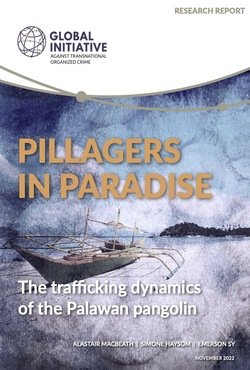By Alastair MacBeath, Simone Haysom, Emerson Sy
In recent years, several studies have raised alarm at the illicit trade pressure on the Philippines’ endemic pangolin species – the Palawan pangolin. Between 2018 and 2019, seizures of Palawan pangolins increased more than ninefold compared with the previous 18 years.1 Around 20 live pangolins have been ‘retrieved’ in and around Metro Manila, a several hundred kilometres boat ride away from their natural habitat, the province of Palawan – also known as the Philippines’ ‘last ecological frontier’. Recent studies have estimated that as many as 26 784 pangolins may be illegally hunted on the islands of Palawan per year,2 with much of the meat and most of the scales making their way to buyers based either in Manila or abroad, making this a national problem driven by international demand. In light of these indications of burgeoning illegal trade, this report was undertaken with three aims in mind: 1) to understand the broader context of drivers and factors that shape pangolin trafficking dynamics; 2) to shed light on the nature of networks driving the trade; and 3) to identify challenges and gaps in the state response. It is intended to complement work undertaken under the rubric of a broader project by the Zoological Society of London and six other organizations, namely 'Combating Palawan pangolin trafficking: Empowering community-based protection and proactive enforcement', funded by the UK Department for Environment, Food and Rural Affairs. The primary components of this project focus on community-based responses to illegal hunting, but also seek to improve…..
-
the government response at various levels of the trade chain. The report sets out how trafficking of the Palawan pangolin has grown over the last two decades, with what appears to be a sharp acceleration from around 2016. This rise has been linked both to shifts in the broader illicit economy in the Philippines, burgeoning links between pangolin consumer populations and the country, and global shifts in the patterns of illicit trade. We also describe the challenges facing the Filipino government agencies charged with responding to wildlife trafficking, which have created gaps in the state response that trafficking networks have profited from.
Geneva: Global Initiative Against Transnational Organized Crime, 2022. 46p.


